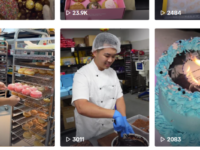At a time when ‘new year, new you’ messaging was flooding our feeds, Laura Henshaw – the CEO of health and wellness app Kic – launched a campaign to take on the concept of unrealistic New Year’s resolutions. Kic’s ‘Feel Good’ campaign was designed to empower people around the world to make 2024 the year they leave behind aesthetic-driven goals and, instead, focus on setting small, realistic and achievable intentions that will increase their overall happiness and health.
We spoke to Laura about the brand, whose mantra is, “It’s not about how you look, it’s about how you feel”, the ethos behind the Feel Good campaign and the results for the business – both here in Australia and overseas.
ISB: Please tell us a little about the history of Kic – the ‘who’, ‘why’, ‘where’ and ‘when’.
Laura Henshaw: My business partner and best friend, Steph Claire Smith, and I started Kic back in 2015. We met in Melbourne through the modelling industry and quickly formed a strong bond over our unique but similar experiences with body image issues, which were fuelled by a toxic diet culture. It sparked our passion to help young women find a sustainable and realistic approach to food and fitness. Kic started as a recipe eBook designed to help make healthy eating more accessible. In 2017, we launched our online workout offering, and we launched the Kic app soon after with a third-party provider.
After a year working with that third-party provider, we decided to go out on our own and so, in 2018, we took the biggest risk to date, leaving our subscriber database and all our content behind and starting from scratch. We had so much we wanted to achieve under Kic, and this was a pivotal moment in making that happen. We had three months to rebuild and relaunch the app, and we did it. As a result, we experienced significant growth – it was a scary yet strategic move that we will forever be proud of.
Since day dot, Kic has stayed true to its stance against toxic diet culture. When we launched, social media was flooded with quick-fix diets and transformation images, some of which are still trending today. We are fully aware that if we had promised ‘weight loss’, it would likely have driven more sales but we truly believe that without our sustainable approach to healthy living, we wouldn’t be where we are today.
ISB: How did you and Steph go about building an engaged community of 2.5 million people in over 100 countries?
LH: As a purpose-led business, community is everything. Hearing how Kic has made a positive impact on their lives is hands down the best part of what we do. In terms of growth, I truly believe that connection and vulnerability have been vital in building our Kic community. Our personal brands are so entwined with Kic; we’ve always been open and honest about our struggles, from body image to imposter syndrome, and our community has related to that.
We’re constantly engaging with our community online, but prioritising in-person community events is important to us. Last year, we flew to the UK and in the space of 10 days we held eight events, meeting with over 500 community members. We had a waitlist of 2000 people hoping to meet with us. We knew through our data that we had community members in over 120 countries, but actually meeting and connecting with people across the globe was surreal. We’ve been hosting our podcast, KICPOD, for over five years now, which has allowed us to connect with our community on a deeper level. We’re not afraid to have the conversations that people are craving and, as a result, the podcast has had over 14 million downloads and garnered 160K-plus unique monthly listeners. We have an incredible content team that is growing and engaging with our social media community on a daily basis. We also have a strong partnership strategy to help us connect with like-minded communities, which ultimately helps us grow ours.
ISB: What was the ethos behind your ‘Feel Good’ campaign?
LH: Only 7 per cent of people achieve their New Year’s resolutions. So, that means that 93 per cent of us are setting ourselves up to fail. It was clear to us that the ‘new year, new you’ mindset doesn’t help us make positive long-term changes. Instead, through our Feel Good campaign, we focused on supporting our community in making small, sustainable changes they can actually maintain.
It may sound controversial, but I don’t believe in New Year’s resolutions. When we set ourselves these unrealistic expectations that will ‘completely transform our lives’, it’s only setting us up for failure. Our approach to healthy living is simple and sustainable. If it’s not something that you can do comfortably, consistently, confidently and, most importantly, happily, then you won’t find it in our app.
ISB: And what was the outcome of the campaign in terms of app uploads and reviews?
LH: The new year period is the most competitive time of the year in the fitness industry, so taking a stand against societal norms was a risk, but I’m incredibly proud of our bold approach – and it worked. Our Feel Good campaign marked our most successful January to date. Revenue was up by 100 per cent on the same period last year, UK revenue was up by 140 per cent, we’ve had 19 per cent subscription growth and, most importantly, tens of thousands of people have moved their bodies, purely for the benefit of feeling good.
As Kic leans further into its mission ‘to change the relationship that people have with wellness and themselves’, it’s incredible to see the significant impact on the business’ metrics.
ISB: How do you see Kic growing and developing in the next couple of years?
LH: We have big plans for Kic for the next few years (and beyond), including some game-changing app features, huge partnerships and so much more. The past few years have been incredibly important in building some of the core foundations and this is starting to pay off in spades.
Society as a whole is starting to reject companies that lean into toxic diet culture. Instead, people are looking for sustainable, authentic wellness brands, which is what Kic is at its core. It is a super exciting time for us, and it truly feels like it is just the beginning.
This article first appeared in issue 45 of the Inside Small Business quarterly magazine















